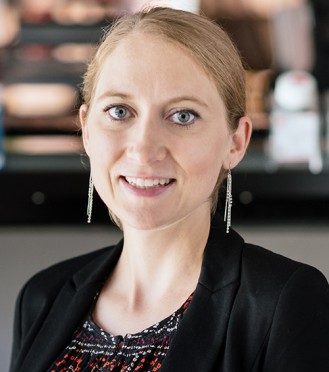Gladstone NOW: The Campaign Join Us on the Journey✕

Karin Pelka and her interdisciplinary team are working to create novel immune-driven therapies that treat—and possibly even cure—the most widespread form of colorectal cancer.
The Colorectal Cancer Alliance has awarded Gladstone Investigator Karin Pelka, PhD, a $500,000 grant to advance research focused on developing immunotherapies that overcome the most common form of colorectal cancer.
For this project, Pelka has partnered with Stanford Medicine oncologist Chris Chen, MD, who brings valuable clinical insights to the research. The two are determined to shatter what Pelka calls the “immunotherapy ceiling” in colorectal cancer so more patients can benefit.
“Without research, there is no progress,” says Michael Sapienza, CEO of the Colorectal Cancer Alliance, in an announcement. The organization’s newly awarded grants come out of its Project Cure CRC initiative, which is making available tens of millions of dollars to researchers whose work aims to find a cure for colorectal cancer, the second-leading cause of cancer death in the nation.
Bringing Immunotherapy to More Patients
Pelka, a cancer immunologist, studies the cellular interactions that shape how the immune system responds to tumors. A graduate of the University of Bonn with a doctorate in innate immunity, Pelka joined the Gladstone-UCSF Institute of Genomic Immunology in 2021 after serving as a postdoctoral fellow at the Broad Institute of MIT and Harvard.
“Despite the prevalence of colorectal cancer, chemotherapy drugs developed more than 30 years ago remain the backbone of treatment for the vast majority of patients,” says Pelka, who is also an assistant professor in the Department of Microbiology and Immunology at UC San Francisco. “This support from the Colorectal Cancer Alliance will allow us to open a new door to potential treatments and cures for all.”

Immunotherapy has revolutionized treatment for patients with a less-common form of colorectal cancer; in some cases, the patients are spared from invasive surgeries or their cancer is eliminated altogether. But those benefits have not yet extended to people with the most common form. Pelka and her team are trying to change that.
Immunotherapy uses a person’s own immune system to fight cancer, by either boosting or changing how the immune system works. Among patients with a less-common form of colorectal cancer known as “mismatch repair-deficient” or MMRd, immunotherapy has revolutionized treatment—in some cases sparing patients from invasive surgeries and eliminating the cancer altogether.
Yet, such benefits have not extended to the approximately 85 percent of patients whose tumors are classified as “mismatch repair-proficient,” or MMRp.
“Immunotherapy represents the best hope of long-term response or even cure for patients with advanced solid tumors that are no longer responding to standard treatments,” says Chen, who is leading several immunotherapy clinical trials in colorectal cancer at Stanford Medicine. “However, only a small percentage of colorectal cancer patients respond favorably to current immunotherapies. That’s why we so urgently need new options.”
Pelka and Chen believe a fundamentally different method is needed to develop drugs for this type of cancer. Based on preliminary computational and clinical data from Pelka’s team, they hypothesize that an effective immunotherapy will need to reduce certain cells in MMRp tumors that dampen the immune response.
Chen’s ongoing clinical trials, which test this approach, provide first hints towards this hypothesis. His preliminary results are consistent with recent clinical studies conducted elsewhere, which have shown that depleting regulatory T cells using a new approach can lead to remarkable response rates in gastric cancer that didn’t respond to previous immunotherapies.
A More Systematic Approach
“Immunotherapy can be incredibly powerful when it works,” Pelka says. “But to get there for all colorectal cancer patients, we need to take a more systematic and comprehensive approach to understanding which immune and non-immune cells need to function together to orchestrate effective anti-tumor responses.”
Pelka’s team plans to leverage artificial intelligence and other tools to more intricately map out the cellular networks at play so they can build on their clinical progress to develop effective therapies.
“New immunotherapies are clearly needed for colorectal cancer, which unfortunately affects way too many people, including young people,” says Alex Marson, MD, PhD, director of the Gladstone-UCSF Institute of Genomic Immunology. “Karin’s research presents a promising new path towards eventually transforming colon cancer into a curable condition.”
The Colorectal Cancer Alliance is the largest national nonprofit organization dedicated to colorectal cancer. Its goal is to end the disease within our lifetime by advocating for prevention, magnifying support, and accelerating research.
For Media
Kelly Quigley
Director, Science Communications and Media Relations
415.734.2690
Email
About Gladstone Institutes
Gladstone Institutes is an independent, nonprofit life science research organization that uses visionary science and technology to overcome disease. Established in 1979, it is located in the epicenter of biomedical and technological innovation, in the Mission Bay neighborhood of San Francisco. Gladstone has created a research model that disrupts how science is done, funds big ideas, and attracts the brightest minds.
Featured Experts
CIRM Awards $7.5 Million in Discovery Grants to Gladstone Investigators
CIRM Awards $7.5 Million in Discovery Grants to Gladstone Investigators
Two ambitious research projects led by Gladstone investigators are boosted by funds from the California Institute for Regenerative Medicine.
Grants News Release Congenital Heart Disease Cardiovascular Disease Bruneau Lab Conklin Lab CRISPR/Gene Editing Human Genetics Regenerative Medicine2025 Searle Scholar Andrew Yang to Expand Inquiry into Blood-Brain Barrier
2025 Searle Scholar Andrew Yang to Expand Inquiry into Blood-Brain Barrier
The Gladstone scientist has received a prize to study how molecules cross the blood-brain barrier and influence brain health.
Grants News Release Neurological Disease Yang Lab$5 Million Grant Bets on Computational Biology, AI to Change the Future of Cancer
$5 Million Grant Bets on Computational Biology, AI to Change the Future of Cancer
The Biswas Family Foundation and Milken Institute announce funding to establish a center for computational cancer biology at Gladstone Institutes, led by Senior Investigator Katie Pollard.
Grants News Release Cancer Biswas Center for Transformative Computational Cancer Biology Data Science and Biotechnology Pollard Lab AI Big Data




